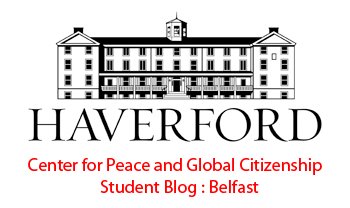Today I started my work at the CEP, Community Empowerment Partnership, in Belfast; unlike Hazelwood, it does not have protective walls and an idealistic atmosphere (literally and figuratively, though I realized that cross-community groups and activities are just as important in integrated schools since the children tend to resort back to their own communities and coerced societal positions once they leave school.. something I wasn't conscious of while at Hazelwood). I worked with a very kind and engaged youthworker; he is a member of the (no longer militaristic) IRA/Sinn Féin and was held in the Maze Prison for five years during the Troubles. The group is thus naturally a Catholic youth empowerment group, but the CEP does work with Protestant children as well and is working towards creating cross-community groups. As my co-worker articulated though, it is difficult to force integration upon people and such integration requires an extensive amount of time and patience. I asked him whether he thought the situation in Belfast is similar to racism and the "black-white" conflict in the states, to which he replied that it's the same and yet not the same. He reiterated that which I've already recognized: it is a bit more complex in Northern Ireland due to the various variables aside from the foremost religious differentiation, but there is a similarity in terms of the repression of Catholics social-structurally. One such example of this is the unemployment rate in Northern Ireland, that in being that Catholics are twice as likely to be unemployed than Protestants; they also more often frequent prisons. Thus, the group of kids today were all Catholic, and he admitted that if you questioned their perceptions and opinions of Protestants, they'd tell you upfront that they hated them. I appreciated his honesty and realized that the solution is not as easy as merely having both sides work together in various teambuilding activities; rather, it's quite necessary to first fortify the foundation with a sense of unity and empowerment within each individual group, particularly the Catholic youths who, judging by my perceptions and especially by the current suicide tragedy of Catholic youths in Northern Ireland, seem to have suffered the most.
Today, we went caving and then canoeing; the caving was especially effective, as the kids had to physically and verbally work together to transgress through the caves (which entailed squeezing through small, tight spaces; climbing vertically; and twisting the body in inconceivable ways to find our way out safely!) I could tell that overall they really are good kids, but some tended to have discipline and anger-management issues; I hope to help my co-worker these upcoming weeks break through these barriers that some of the kids have chosen to posit and perhaps aid in disintegrating them. The next few days we'll be doing various other teamwork and communication activities; this youth group is additionally a means of keeping the Catholic kids off of the streets as well as providing for them an alternative, positive image within their own community so as to impact their future decisions in their, hopefully, cross-communities.








.jpg)















1 comment:
Your work sounds so challenging. I remember feeling the same way in Ecuador--that the poverty people were living in didn't seem "that bad"-- everyone was generally happy and families would get along much better than I've ever seen in America because they worked as a team and children were mature beyond their years. It's hard to remember that you are making a difference: even if you're not solving conflicts on a political scale, you are showing the kids you care about them, that you came from America because you wanted a part in resolving these religious problems, if even very slowly. It's that motivation and caring to make a difference that is what really will make a difference in the end. Love,
elo
Post a Comment